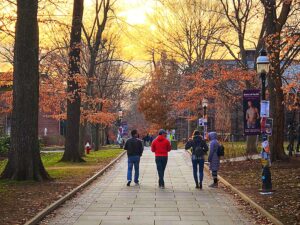Ivy Scholars wants to help you on your college admissions journey. To that end, we’ve put a lot of resources up on our website to guide you through the various stages of the process, from Candidacy Building in early high school, to preparing for standardized tests, to every aspect of the college application process.
In this guide, we’ll put all of these resources in order, and make them more widely accessible. By reading through this guide, and the linked articles, you will learn all we know of the college applications process, and be well prepared for your own journey.
Most of this advice will describe what colleges are looking for, and why they want these things. For more worksheets and guided exercises, see our Guide to Everything. This includes all the resources we use with our students, and is a good complement to this guide.
If you are worried we won’t be able to help you in time, see our article on whether you’re too late to begin (hint: you usually aren’t).
In the Beginning: Building Candidacy
We recommend beginning with our article on planning for college admissions. What you read next depends on what stage of the process you’re on. If your student is in junior year or earlier, we recommend you begin with Candidacy Building. If you are currently preparing for standardized testing, jump to our section on that. Finally, if you are in spring of junior year or later, head to our section on college applications.
If your student is still in middle school, see our guide to choosing a high school, and our guide to the best high schools in Houston. While other articles may be of interest to you, most of our materials are aimed at high school students.
We have two guides on coursework in high school, one on AP courses and exams, and one on IB programs. See our article on high school grades to learn why these matter, and what top colleges expect for academic performance in high school.
Most of our articles focus on extracurriculars, because the best thing you can do to prepare for college early in high school is to find and explore your passions through extracurriculars. We have an article on extracurriculars generally, and why they matter, this serves to explain why colleges care so much about what you do outside the classroom.
What colleges are looking for are signs of your child’s leadership ability, that they care about their community, and that they are passionate about learning. You can learn about these in our articles on leadership, volunteering, and intellectual vitality. These articles describe primarily why colleges care about these traits, and how students can best demonstrate them through their extracurricular involvement.
If you are struggling to find ways to get involved, check out some of the following articles:
- How to do research in high school. This article covers how high school students can get involved with research projects, or begin doing research on their own.
- Nonprofits for college admissions. This article covers volunteering at nonprofits, and how to do so in a way that best demonstrates your skills to colleges.
- Finding an internship. As its name suggests, this article is a step-by-step guide to finding an internship while you’re still in high school, including where to look, how to apply, and what to consider when deciding where to intern.
- Summer programs guide. Summers give you a break from school work, and allow you new opportunities to explore your interests. This guide covers a number of top summer programs from around the country. If you are more generally concerned with how to spend your summer, see our article on how best to make use of your time in summer.

Standardized Tests
The next stage of your journey is preparing for standardized tests, either the SAT or the ACT. Some schools have gone test optional recently, to learn how a test optional approach will impact your admissions, see our article on that subject.
To learn how we help students prepare for standardized tests, see our article on the secrets of test prep. If you suffer from test anxiety, you should read our article on how to combat and overcome it.
Many students wonder if studying for standardized tests is a worthwhile use of their time. We believe it is. While you should leave time for other activities, spending time to prepare for standardized tests can greatly increase your chances of college acceptance. You can find more on our reasoning in our article here.
Most students only have the option to take the ACT or the SAT. If however, you have the chance to take both, we recommend you do so. Most students are better at one format or the other, and you only need to send the scores of the test you did better on to colleges. You can find more about our reasoning in our article on whether to take the SAT or ACT.
College Applications
This is the longest section, and we will break it into subsections for convenience. These sections mimic the phases of college applications we use with our students. In the first, we determine what the student is looking for in a college or major, and build a college list strategically to meet a student’s needs.
This is also the stage where we begin thinking about financial aid, as the cost of college can be a major factor in deciding when to apply. Financial aid and finances have their own section.
Next, we fill out application portals. This includes composing an activities list, and requesting letters of recommendation from teachers. These are smaller details, but are better dealt with early, rather than leaving them until the last minute and needing to rush.
Then it comes time to write the essays themselves. We generally begin with the personal statement, then move on to the supplemental essays. This is the phase of applications which takes the longest, as your essays are your chance to address admissions officers directly, and you need to decide what you’ll say carefully.
Next come the smaller details, and the things which are usually handled after applications are submitted. This section includes college interviews, the college transition, and college visits.
Finally, we have specific advice for students in more unique situations, or with unique backgrounds that can majorly impact their admissions decisions. These have their own guides, as they affect multiple stages of the college admissions process.
For parents interested in helping their children on this path, we recommend beginning with our article on how parents can help their children apply to college. You have a lot to offer, but in the end, it is your child who must apply to colleges, and your child who will go on to attend. Your desire to help is admirable, and our article gives you tips for the most successful ways you can do so.
Where to Apply to College
The first thing to determine is which college is right for you. This is based on two things: the first is which colleges you have a good chance of getting into, and the second is what factors matter to you in a college. The article goes into more detail on both points. The general takeaway is that you should apply to colleges with a range of difficulties for admission, all of which you would be happy to attend. For details on filling out your college list, see our article on building one.
When building a list, it is often necessary to research colleges, to see what they can offer you. Our article on how to do college research is a guide to finding out relevant information. For more information about top colleges, see our college guides, which also have advice on application strategy for top schools.
While you do not need to have a major picked out right now, the major you apply as does impact your chances of admission. Take time to pick a major that you will succeed in, that also positions you well to apply to colleges.
Finally, you will need to make decisions about when you will apply, including Early Decision and Early Action applications. Our guide to ED vs EA breaks down the possibilities offered by both. If you are stuck between two schools, see our guide to choosing an ED school. You should also consider ED II at this time, see our article to find out if ED II is right for you.

Financial Aid
Paying for college is a challenge for many, especially as costs rise. How you’ll pay for college can impact where you apply, and where you attend among the schools you get into. Our article on need blind vs. need aware admissions covers the strategic concerns of applying to both types of programs.
Regardless of where you apply, financial aid needs to be applied for separately. Our guide to financial aid covers the basics of FAFSA, the CSS Profile, and other sources of financial aid for students. This covers both need based and merit based sources of aid.
For school specific information, see our articles on Ivy League financial aid and on college specific scholarships. Most schools have their own scholarships, the ones in the article are those which require a separate application to be considered for. This list is not comprehensive; we recommend reading the financial aid website of any college you apply to.
App Portals and Activities
Most of your applications will be submitted through the Common App, and we have a guide to how to fill out its various sections. Not all colleges use the Common App, but most do. Notable exceptions are the UC schools, and Texas schools.
UC schools have their own application, and we have an article covering how to complete it. Here is our guide to ApplyTexas, used by public, and some private, universities in Texas.
Finally, you can apply to schools using the Coalition Application, though this is accepted by fewer schools than the Common App. Generally, we advise our students to use the Common App, due to its wider use.
To learn how to write an activities list that will fully demonstrate your accomplishments, download our guide. For exercises to complete when writing an activities list, see our guide to everything.
When asking for letters of recommendation, the first thing you will need is a brag sheet, which we explore in detail in our article on brag sheets. Once you’ve composed that, you need to select teachers to write your letters, for advice see our guide on getting great letters of recommendation.
Writing Your Essays
Once you have completed all the little details of the application, it’s time to move onto the meat: your essays. We generally begin with the personal statement, before moving on to the supplemental essays. All essay writing begins with brainstorming, and we outline how in our article on brainstorming for your essays.
Once you have topics, see our guide on starting and ending a personal statement, and our article on how to edit your college essays. This advice will also apply to your supplemental essays.
For advice on writing and cross applying supplemental essays, see our guide on the kinds of supplemental essay questions. We use the strategy of cross-applying to limit the amount of work students have to do, and explain the mechanics of this approach in the article.
If you are interested in applying to BS/MD programs, then you will have additional essays to write. You can find a guide to writing them in our article here. A more general guide to applying as a BS/MD student is in our article explaining BS/MD programs.
After Submission
Interviews are not a part of all college applications, but can cause students a lot of stress. We recommend our guide to college interviews for students who worry about upcoming interviews.
If you did not get in Early Decision, don’t panic. Instead, read our guide to learn your next steps. If you get waitlisted or deferred, then read our article on how to proceed, and know that your college application journey isn’t over yet.
Finally, you should be aware that most colleges practice conditional acceptance. While our article goes into more detail, what you need to know is that you don’t get to slack off just because you got into college. If your academic performance falters significantly before you graduate high school, your acceptance can be revoked.
Students with Specific Considerations
Some students have circumstances which greatly alter their path to college, or their admissions process. We have guides to each of these, to help these students best deal with their unique circumstances. Our guides cover:
- Student athletes. This is aimed at student athletes who are looking to be recruited by colleges, and how the recruitment process impacts admissions.
- Art students. This provides information for students who do art and who are seeking to major in art in college. This includes information on portfolios and auditions.
- Homeschooled students. As these students do not have traditional grades or high school teachers, they have additional hoops to jump through when proving their academic experience for colleges.
- International students. Requirements for admission are often more stringent for international students, and there is also less financial aid available for them.
Final Thoughts
While this guide is not the same as receiving guidance from an advisor in person, it has all of the same advice and considerations we use when guiding students. College applications are a convoluted process, but much of their difficulty comes from the lack of knowledge students have when approaching them. We hope that this guide effectively shares our knowledge with you, and lets you approach your college applications with confidence.








